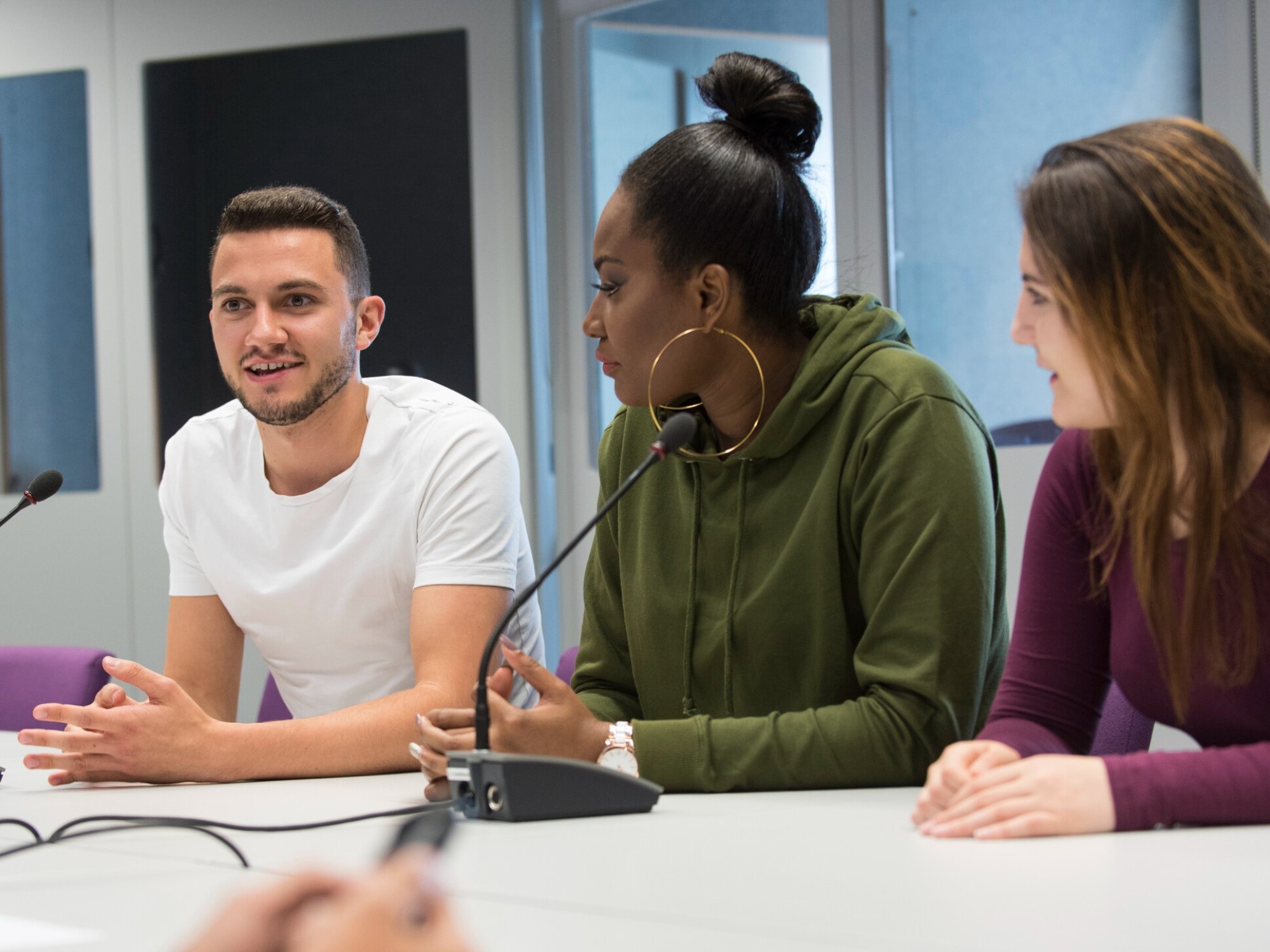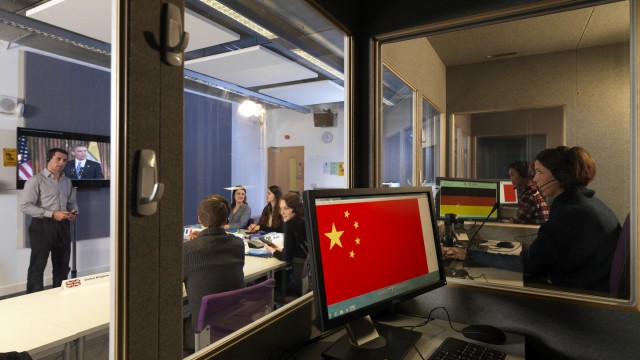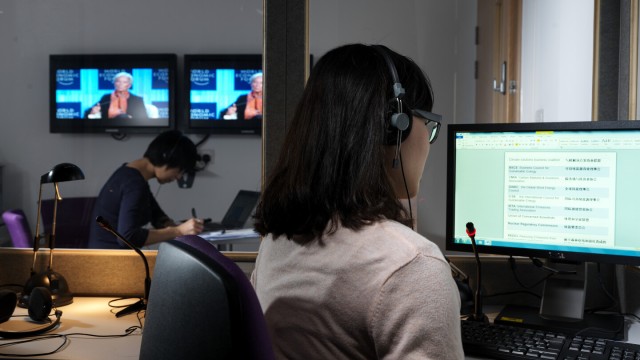
- Translation and Interpreting Studies
PhD Translation and Interpreting Studies
The Centre for Translation Studies, an internationally leading centre for research and teaching in translation and interpreting studies. Our research reflects the evolving nature of the discipline, encompassing a critical understanding of technology-enabled language mediation as well as quality, ethical and social dimensions of a fast-evolving language services industry.
4,138+ people have created a bespoke digital prospectus
Why choose this
programme?
- We combine our knowledge of translation and interpreting as human practices with our expertise in computational linguistics, natural language processing, machine learning/AI, distance communication and human-computer interaction.
- Our research into social perspectives on translation/interpreting workflows allows us to achieve a responsible integration of human and machine in translation and interpreting.
- Since our formation in 1982, we have been awarded prestigious research funding that has allowed us to contribute to the theoretical advancement of translation and interpreting studies, applied to the real world. We achieve this by studying the responsible integration of human and technology-enhanced approaches, novel modalities of audiovisual translation and innovative practices in interpreting.
- We are part of several externally funded doctoral training partnerships, including TECHNE, an Arts and Humanities Research Council (AHRC)-funded doctoral training partnership, which provides access to comprehensive academic and professional training programmes. There are possibilities for studentships and funding for your studies.
- Our new distance-learning route allows you to pursue doctoral research with full academic support, remote supervision, and access to online resources, without needing to relocate or interrupt your professional and/or caring commitments.
Statistics
100%
Of our literature and languages research graduates are in employment or further education (Graduate Outcomes 2025, HESA)
Research excellence
The Research Excellence Framework (REF) 2021 ranked literature and languages 10th for research impact in the UK, with 75% of our case studies rated as having outstanding impact
What you will study
At a time when increasing automation is reshaping language services into one of the fastest growing industries nationally and globally, the ‘technological turn’ in translation/interpreting has created a wealth of opportunities. However, to understand the dimensions of technology’s impact, to mitigate drawbacks and to derive innovative solutions it requires fresh approaches to research.
We are therefore particularly interested in PhD projects investigating how:
- Professional translators/interpreters interact with, and adapt to, emerging technological ecosystems
- This is changing professional practice and the products of this practice
- Human knowledge combined with natural language processing and machine-learning approaches can help design sustainable technology-enhanced solutions in translation/interpreting.
It normally takes three years of full-time study or six years of part-time study to complete our PhD in Translation and Interpreting.
You will be assigned two supervisors, who will guide you through your PhD, meet with you monthly to discuss your progress, and give you feedback and advice on your work. You will also have the opportunity to interact and collaborate with other researchers from the Centre and across the University who work on topics relevant to your research.
As a doctoral student, you’ll receive a structured training programme covering the practical aspects of being a researcher, including grant-writing, publishing in journals, and applying for academic jobs.
Assessment
Your final assessment will be based on the presentation of your research in a written thesis, which will be discussed in a viva examination with at least two examiners.
You have the option of preparing your thesis as a monograph (one large volume in chapter form) or in publication format (including chapters written for publication), subject to the approval of your supervisors.
You will take a confirmation viva at 12-15 months (or 24-30 months part-time).
Location
You can study for your PhD in person here in Surrey on our Stag Hill campus or by distance learning online.
Research themes
- Translation technologies, including computer-assisted translation, translation memories, machine translation and post-editing
- Interpreting technologies, especially video-mediated interpreting, distance/remote interpreting
- Audio-visual translation including subtitling, audio-description, re-speaking and other modalities
- Collaborative translation
- Translation and natural language processing
- Bilingual lexicography, corpora and translation
- Translation process research
- Translation and interpreting as multimodal activities
- Translation and interpreting in the context of migration
- Dialogue interpreting
- Legal interpreting
- Multilingual healthcare communication
- Multilingual copyrighting
- Sociological approaches to translation
- Humour in translation.
Discover more about the research in the literature and languages research.
Research centres and groups
See a full list of all our academic staff within the Centre for Translation Studies.
Research support
The professional development of postgraduate researchers is supported by the Doctoral College, which provides training in essential skills through its Researcher Development Programme of workshops, mentoring and coaching. A dedicated postgraduate careers and employability team will help you prepare for a successful career after the completion of your PhD.
Facilities
You will benefit from excellent facilities, including specialist software and hardware for research, for example: software to support computer-assisted translation, linguistic/corpus-based analysis, subtitling, re-speaking and audio-description; software for qualitative and quantitative analysis, eye-tracking facilities and dedicated server space.
We are also home to state-of-the-art interpreting laboratories with ISO-compliant professional interpreting booths, video-conferencing tools, mobile interpreting equipment and access to a remote simultaneous interpreting platform.
You will be allocated desk space, and you will also be able to take advantage of our common rooms for socialising and networking with other students and staff.
UK qualifications
Applicants are expected to hold a good bachelors degree and/or masters degree (2:1 or equivalent) in translation studies (translation, audiovisual translation, interpreting.
For other topics, a good bachelors degree and an MA in a relevant topic is required.
English language requirements
IELTS Academic: 6.5 or above (or equivalent) with 6.0 in each individual category and at least 7.0 in the writing component.
These are the English language qualifications and levels that we can accept.
If you do not currently meet the level required for your programme, we offer intensive pre-sessional English language courses, designed to take you to the level of English ability and skill required for your studies here.
Selection process
Selection is based on applicants:
- Meeting the expected entry requirements and providing all relevant documents including a satisfactory research proposal
- Being shortlisted through the application screening process
- Completing a successful interview
- Providing suitable references.
Fees per year
Explore UKCISA's website for more information if you are unsure whether you are a UK or overseas student. View the list of fees for all postgraduate research courses.
* Please note: any start date other than September will attract a pro-rata fee for that year of entry (75 per cent for January, 50 per cent for April and 25 per cent for July).
July 2026 - Full-time
- UK
- £5,006
- Overseas
- £21,000
July 2026 - Full-time with Distance Learning
- UK
- £5,006
- Overseas
- £21,000
July 2026 - Part-time
- UK
- £2,503
- Overseas
- £10,500
July 2026 - Part-time with Distance Learning
- UK
- £2,503
- Overseas
- £10,500
October 2026 - Full-time
- UK
- £5,238
- Overseas
- £21,800
October 2026 - Full-time with Distance Learning
- UK
- £5,238
- Overseas
- £21,800
October 2026 - Part-time
- UK
- £2,619
- Overseas
- £10,900
October 2026 - Part-time with Distance Learning
- UK
- £2,619
- Overseas
- £10,900
January 2027 - Full-time
- UK
- £5,238
- Overseas
- £21,800
January 2027 - Full-time with Distance Learning
- UK
- £5,238
- Overseas
- £21,800
January 2027 - Part-time
- UK
- £2,619
- Overseas
- £10,900
January 2027 - Part-time with Distance Learning
- UK
- £2,619
- Overseas
- £10,900
April 2027 - Full-time
- UK
- £5,238
- Overseas
- £21,800
April 2027 - Full-time with Distance Learning
- UK
- £5,238
- Overseas
- £21,800
April 2027 - Part-time
- UK
- £2,619
- Overseas
- £10,900
April 2027 - Part-time with Distance Learning
- UK
- £2,619
- Overseas
- £10,900
- Annual fees will increase by 4% for each year of study, rounded up to the nearest £100 (subject to legal requirements).
Additional costs
There are additional costs that you can expect to incur when studying at Surrey.
Funding
A Postgraduate Doctoral Loan can help with course fees and living costs while you study a postgraduate doctoral course.
Application process
Applicants should contact potential supervisors before submitting an application via the website. Please refer to section two of our application guidance.
Apply online
To apply online first select the course you'd like to apply for then log in.
Select your course
Choose the course option you wish to apply for.
Sign in
Create an account and sign into our application portal.
The closing date is the last day this month is available for applications, but if you are applying through a studentship you must follow the deadline on the advert to be eligible.
ApplyThe closing date is the last day this month is available for applications, but if you are applying through a studentship you must follow the deadline on the advert to be eligible.
ApplyThe closing date is the last day this month is available for applications, but if you are applying through a studentship you must follow the deadline on the advert to be eligible.
ApplyThe closing date is the last day this month is available for applications, but if you are applying through a studentship you must follow the deadline on the advert to be eligible.
ApplyThe closing date is the last day this month is available for applications, but if you are applying through a studentship you must follow the deadline on the advert to be eligible.
ApplyThe closing date is the last day this month is available for applications, but if you are applying through a studentship you must follow the deadline on the advert to be eligible.
ApplyThe closing date is the last day this month is available for applications, but if you are applying through a studentship you must follow the deadline on the advert to be eligible.
ApplyThe closing date is the last day this month is available for applications, but if you are applying through a studentship you must follow the deadline on the advert to be eligible.
ApplyThe closing date is the last day this month is available for applications, but if you are applying through a studentship you must follow the deadline on the advert to be eligible.
ApplyThe closing date is the last day this month is available for applications, but if you are applying through a studentship you must follow the deadline on the advert to be eligible.
ApplyThe closing date is the last day this month is available for applications, but if you are applying through a studentship you must follow the deadline on the advert to be eligible.
ApplyThe closing date is the last day this month is available for applications, but if you are applying through a studentship you must follow the deadline on the advert to be eligible.
ApplyThe closing date is the last day this month is available for applications, but if you are applying through a studentship you must follow the deadline on the advert to be eligible.
ApplyThe closing date is the last day this month is available for applications, but if you are applying through a studentship you must follow the deadline on the advert to be eligible.
ApplyThe closing date is the last day this month is available for applications, but if you are applying through a studentship you must follow the deadline on the advert to be eligible.
ApplyThe closing date is the last day this month is available for applications, but if you are applying through a studentship you must follow the deadline on the advert to be eligible.
ApplyAfter registration
Students are initially registered for a PhD with probationary status and, subject to satisfactory progress, subsequently confirmed as having PhD status.
About the University of Surrey
Need more information?
Contact our Admissions team or talk to a current University of Surrey student online.
Code of practice for research degrees
Surrey’s postgraduate research code of practice sets out the University's policy and procedural framework relating to research degrees. The code defines a set of standard procedures and specific responsibilities covering the academic supervision, administration and assessment of research degrees for all faculties within the University.
Download the code of practice for postgraduate research admissions (PDF).
Terms and conditions
When you accept an offer to study at the University of Surrey, you are agreeing to follow our policies and procedures, student regulations, and terms and conditions.
We provide these terms and conditions at the offer stage and are shown again at registration. You will be asked to accept these terms and conditions when you accept the offer made to you.
View our generic registration terms and conditions (PDF) for the 2025/26 academic year, as a guide on what to expect.
Disclaimer
This online prospectus has been published in advance of the academic year to which it applies.
Whilst we have done everything possible to ensure this information is accurate, some changes may happen between publishing and the start of the course.
It is important to check this website for any updates before you apply for a course with us. Read our full disclaimer.



